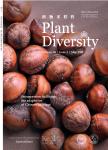Phylogeny,character evolution,and classification of Selaginellaceae(lycophytes)
作者机构:School of Ecology and Environmental ScienceYunnan UniversityKunming 650504YunnanChina Missouri Botanical Garden4344 Shaw BlvdSt.LouisMissouri 63110USA Chengdu Institute of BiologyChinese Academy of SciencesChengdu 610041SichuanChina
出 版 物:《Plant Diversity》 (植物多样性(英文版))
年 卷 期:2023年第45卷第6期
页 面:630-684页
核心收录:
学科分类:0710[理学-生物学] 071001[理学-植物学] 07[理学]
基 金:partially supported by the Natural Science Foundation of China (#31900186,#32260050) Yunnan Fundamental Research Projects (Grant NO.202301BF07001-016) the Glory Light International Fellowship for Chinese Botanists at Missouri Botanical Garden (MO) to X.M.Zhou
主 题:Generic classification Homoplasy Lycophyte phylogeny Megaspore types Microspores Nuclear 18S and 26S genes
摘 要:Selaginella is the largest and most taxonomically complex genus in *** fact that over 750 species are currently treated in a single genus makes Selaginellales/Selaginellaceae unique in *** we assembled a dataset of six existing and newly sampled plastid and nuclear loci with a total of 684 accessions(74%increase of the earlier largest sampling)representing ca.300 species to infer a new *** evolution of 10 morphological characters is studied in the new phylogenetic *** major results include:(1)the nuclear and plastid phylogenies are congruent with each other and combined analysis well resolved and strongly supported the relationships of all but two major clades;(2)the Sinensis group is resolved as sister to *** with strong support in two of the three analyses;(3)most morphological characters are highly homoplasious but some characters alone or combinations of characters well define the major clades in the family;and(4)an infrafamilial classification of Selaginellaceae is proposed and the currently defined Selaginella *** split into seven subfamilies(corresponding to the current six subgenera t the Sinensis group)and 19 genera(the major diagnosable clades)with nine new species-poor *** support the conservation of Selaginella with a new type,***,to minimize nomenclatural *** provide a key to subfamilies and genera,images illustrating their morphology,their morphological and geographical synopses,a list of constituent species,and necessary new *** new classification will hopefully facilitate communication,promote further studies,and help conservation.



